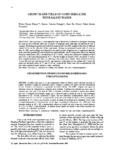Please use this identifier to cite or link to this item:
http://www.alice.cnptia.embrapa.br/alice/handle/doc/70379| Title: | Growth and yield of corn irrigated with saline water. |
| Authors: | BLANCO, F. F.  FOLEGATTI, M. V.   GHEYI, H. R.   FERNANDES, P. D.   |
| Date Issued: | 2008 |
| Citation: | Scientia Agricola, Piracicaba, v. 65, n. 6, p. 574-580, Nov./Dec. 2008. |
| Description: | Corn (Zea mays L.) is an important crop in Brazil and is cultivated in all regions, including the semi-arid area of Brazil, where the occurrence of irrigation water with high concentration of salts is common. Evaluating the growth and yield of the maize hybrid 'AG 6690' irrigated with water of different salinity levels was the objective of this experiment. Sowing was performed in pots with 12 seeds on May 23, 2003, and seedlings were thinned to two plants per pot. Irrigation was accomplished when the mean soil matric potential of each treatment was approximately -30 kPa using water with seven different electrical conductivities (ECi), varying from 0.3 to 4.5 dS m-1, which were obtained by addition of NaCl and CaCl2 in the equivalent proportion of 1:1. The dry weights of all parts of the corn plants as well as their evapotranspiration and water use efficiency were reduced by salinity. Grain yield decreased by 21 and 20% for each unit increase of ECi and electrical conductivity of soil solution (ECs) above the respective threshold values of 1.7 and 4.3 dS m-1, respectivelly. Plants were able to maintain the leaf area index unaltered under moderate saline conditions. |
| Thesagro: | Área Foliar Evapotranspiração Solução do Solo Zea Mays |
| NAL Thesaurus: | evapotranspiration leaf area soil solution |
| Keywords: | Tolerância à salinidade Tolerance to salinity |
| Type of Material: | Artigo de periódico |
| Access: | openAccess |
| Appears in Collections: | Artigo em periódico indexado (CPAMN)  |
Files in This Item:
| File | Description | Size | Format | |
|---|---|---|---|---|
| SCIAGv65n6p574.pdf | 61,72 kB | Adobe PDF |  View/Open |









